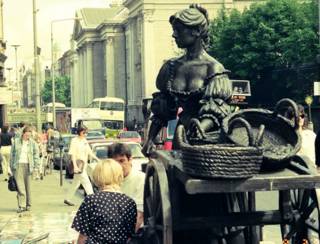This is a re-enactment, with artistic licence, of a true event in our tuatha/clan history, circa 280 BC. Labraid Loinseach -- later known as Moen -- was the son of Aillil Aine, a king in eastern Ireland. Aillil was poisoned by his brother Cobhthach who usurped his throne. Following this event our poem begins ….
I.
He was your loving Daddy, I know,
Arra, Moen mo chara, but listen,
Am I not the same blood as you,
As you and your Daddy and all your kin?
Am I not your uncle, lad,
And aren't we all the same family
When all is said and done?
'Twas a sad business, I know,
And the shock is still with you ,
But it's only a wee lad you are,
And there are ways in this world
That are hard to understand:
The gods with all their glory, son, change
Nary a moment of what's gone by.
Listen close to me, boy, when a thing
Is done, it's done, and it's done forever;
The necessity is within the family, our family,
And not a person outside will dare say one word,
And this, this is the truth I'm telling you.
Now will you stop your tears, 'tis no manly thing,
Even for the age that's on you.
II.
This is a hard fractured land
We live in, boy, with enemies
North and South of us, aye,
Enemies to the West as well.
The job of a king is a hard business
('Tis a thing you wouldn't understand)
And the hawking and the feasting and the harpers
In the style of your father
Was the road to rapid ruin.
Wheesht, here it comes, something just for you!
Haven't I had orders sent down to the kitchen
Something in the way of showing you, boy,
How I love you, how I guard for your health.
Set the dish down, give the boy the smell of it.
Eat now, darling boy, eat hearty,
And it's afterwards, nephew, you and me,
'Tis afterwards we'll know where we stand.
---------------------------------------------------------------------
Móen was only a young child of 8 or 9 at the time of the murder of his father and he was rescued from the clutches of his uncle Cobhthac ("Kovhak) by the intercession of his father's true companions, who spirited the young boy away and accompanied him to Gaul, now France, then a Celtic territory of many separate kingdoms.
Owing to the horror of having (unwittingly) eaten his father's heart -- and that's what the subject of the poem is all about -- he lost the power of speech.
He was received kindly in Gaul and gradually the power of speech was restored to him in the kingdom of Fir Morc. The local king, Scoriath, gave him the hand of his daughter and provided him with an army of spearmen to reclaim his stolen inheritance. They were called "Laighin" which referred to the blue steel of their speartips.
The invasion (268 BC) was successful and Móen was restored as king (his wicked uncle was executed straight away or after a subsequent act of treachery, there are two different stories) and thus became the ancestor of our clan in Ireland, which flourished with its capital at Tara until overthrown by the northern O'Neill's in the 4th century AD.
The eastern province of Ireland is still known as "Laighin" in the Irish language, We are an extremely conservative people (until we go to America and become Democrats). In English the province is known as "Leinster", which is a combination of the Gaelic "Laighin" with the later Viking suffix of "stadr" (state): thus "Laighin-stadr" becomes "Leinster". If you think I am making this up, please have a look at any map of modern Ireland ….
Scholars and skeptics (same thing) can always check out the historical record. The Annals go back to about 600 BC -- we were latecomers, I guess -- but modern scholarship and archaeology have been combining to show that the surviving written records are extremely accurate. For the historical background to this poem check the following:
Peter Beresford Ellis. "The Celtic Empire": Constable & Co. (London), 1991: pp 184-85
I am sorry to say that in spite of our dramatic origins, the clan/tuatha hasn't done a single thing of historical interest or importance for the last 1600 years, since losing Tara, in fact, although we continue to reproduce alarmingly. That's how family names survive for 2000 years, but you might as well be an iguana. They keep out of trouble, too. I think it's far more fun to give your enemies a whack.

